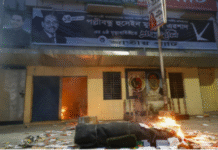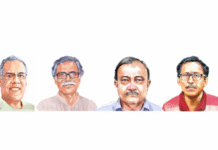Recent events in Thailand bear some parallels with events in Bangladesh. In both countries, the party out of power demands an interim caretaker government. In Thailand, the ruling majority, confident of its support from the majority of the voters, has called for new elections. The opposition, supported by the urban well to do, and some say, the military, is campaigning against holding elections, and instead, has proposed a “peoples council,” with only 100 of 400 people directly elected by voters. The remaining 300 would be selected, who and by what means is not clear. So, the opposition demands a caretaker government, an unelected Peoples Council, to reform politics.
To press their demands, the opposition in Bangkok has called for a siege of the city, and invited its followers from across Thailand to march into Bangkok and occupy every inch of the city. But as an astute observer commented in the Bangkok Post, “Democracy:- Government by the people; a form of government in which the supreme power is vested in the people and exercised directly by them or by their elected agents under a free electoral system. I’m having a difficult time understanding how occupying an entire city and preventing your opposition parties from being able to conduct any business could be considered as democratic, the same as obstructing others from registering could also be. As an outsider looking in with many friends in Thailand it appears to me that Suthep (opposition leader) is simply a bully who is throwing a tantrum because he is isn’t getting his way.” And the observer is correct because all indications suggest that the opposition is unlikely to win elections, and hence, they call for extra-constitutional caretaker government.
The caretaker system of government worked quite well in Bangladesh. But the interim government formed in 2007, with an unelected set of advisors with support from the military, stayed on much too long, with the promise that they too will reform politics (’minus two’ solution) and stamp out corruption in Bangladesh. In the end, they failed; elections had to be held, and power transferred to elected representatives of the people. The finding that the 13th Amendment was unconstitutional gave the ruling party the opportunity to declare future elections will be held with interim government formed with elected representatives only. The PM has repeatedly said that Bangladesh, like in other countries with the parliamentary system of government, has the ability to hold fair and credible elections without a government formed by non-elected advisors. The opposition leader declared in 2011 that only a non-partisan caretaker government would do, and she has stuck to her guns.
 So, the lines were drawn early, and neither the PM nor the opposition leader has moved to reconcile differences. Unlike in Thailand, in Bangladesh, all indications are that the ruling party may not fare so well if free and credible elections are held, and the opposition could very well win. So a not so popular ruling party rejects the idea of a non-partisan government calling such a caretaker government extra constitutional, even though the highest court said that the 10th and 11th parliamentary elections could be held under a non-partisan caretaker government. So, in two countries, two realities: In Thailand, a not so popular opposition is in favour of a caretaker government to deny those who have a popular mandate; and in Bangladesh, a not so popular government rejects the idea of a caretaker government, perhaps in fear of losing their mandate.
So, the lines were drawn early, and neither the PM nor the opposition leader has moved to reconcile differences. Unlike in Thailand, in Bangladesh, all indications are that the ruling party may not fare so well if free and credible elections are held, and the opposition could very well win. So a not so popular ruling party rejects the idea of a non-partisan government calling such a caretaker government extra constitutional, even though the highest court said that the 10th and 11th parliamentary elections could be held under a non-partisan caretaker government. So, in two countries, two realities: In Thailand, a not so popular opposition is in favour of a caretaker government to deny those who have a popular mandate; and in Bangladesh, a not so popular government rejects the idea of a caretaker government, perhaps in fear of losing their mandate.
The problem for the ruling party is that the voters in Bangladesh did not believe the PM that a credible election can be held with the ruling party at the helm. Even offers to form an all-party interim government, not a bad idea on paper, was not sufficient. Perhaps the offer came too late. By then, repeated polls have shown that an overwhelming majority of the people, above 3/4ths, believe that a non-partisan government is necessary to hold credible elections. Her arguments for holding elections has failed to convince even her coalition partners, some of whom now have abandoned her, multiplying her problems manifold. And the reaction of the ruling party to their election problem has been truly abysmal. The PM, instead of leading from the front to diffuse the crisis, has instead knit herself into a tight shell from which she cannot move. The ruling party has now embarked on a path of wholesale harassment of the opposition. Hubris, some might say, and they would not be far off. But this assault has convinced nobody, and with voters disenfranchised with more than half of the 10th Parliament elected unopposed, the call for abandoning this election has grown stronger than ever.
The PM is correct that mature democracies do not need a caretaker system of government. But what the PM has failed to recognise is that mature democracies also have mature and strong institutions, foremost among them an independent body, such as the Election Commission, that can plan and hold elections without interference, an independent bureaucracy that can assist in holding of such elections, and an independent judiciary that can freely adjudicate disputes that arise in elections. None of these are present in Bangladesh. But even more consequential maybe the fact that neither the PM nor the leader of the opposition truly believe in democratic rights.
While speaking of democracy, the PM has shown she will use extra constitutional means to silence her opposition. While the leader of the opposition has called for the March for Democracy, her track record going back to 1996, and the more recent attempt at manipulating the caretaker system of government for the benefit of her party does not inspire confidence. The PM and the leader of the opposition have ruled this country for long. But their collective failure is that between them they have not seen the need to reform and strengthen the very institutions that form the backbone of a democracy. And when out of power, they simply refuse to show up in parliament, the very body that exemplifies democratic rule.
They thrive in chasm. Common people are deprived of livelihoods, and common people are burned to death, and the brand that we call Bangladesh suffers immensely, all because allure of power and its spoils trump decency.
——————————-
Muhammad Q. Islam, is an Associate Professor of Economics, John Cook School of Business, Saint Louis University, USA.
Source: bdnews24










